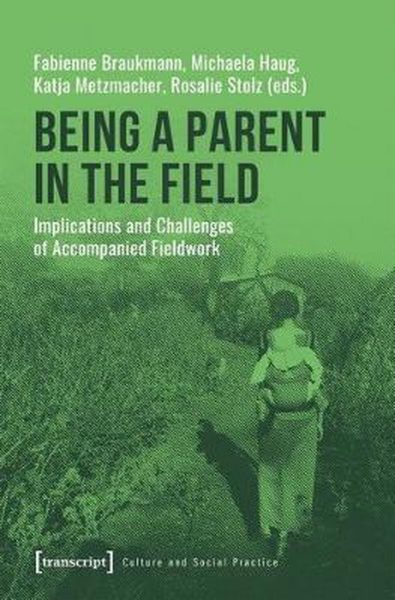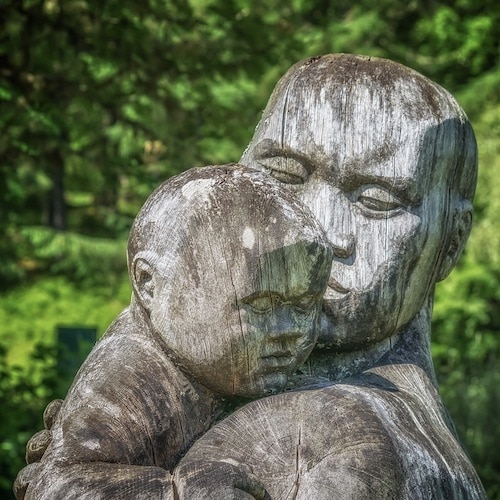In 2017, my colleague Philipp Zehmisch and I had to cancel a panel on love and family relationships in ethnographic fieldwork, due to a lack of participants. Fabienne Braukmann was one of the few researchers daring enough to expose her personal field entanglements at the biannual German anthropology (DGSKA) conference, so I am all the happier that the topic was subsequently taken up by her and a group of committed young scholars for a workshop at the University of Cologne in 2018 that culminated in this edited volume. Covering topics ranging from pregnancy to the long-term perspectives of anthropologist parents who bring one or more children and/or a partner to the field, the book addresses the practical challenges and epistemological chances of accompanied fieldwork.
 Traces of an anthropologist’s family sometimes appear in ethnographic writing as kin-ties to the field or in co-authorship by anthropologist spouses. In addition, many stories of researchers’ building of rapport involve becoming ‘kin’ with some of their interlocutors. The problem of maintaining these ties over longer periods of time, however, has been less frequently recognised (Hughes & Walter 2021). While reflecting on the researcher’s own positionality has come to be an essential part of ethnographic writing, there is a need to lay open the personal as well as more structural impediments of extensive fieldwork periods that are considered so integral to social and cultural anthropology. Just recently, the feminist Manifesto for a Patchwork Ethnography has received much attention with its call to rethink ‘traditional’ fieldwork. It was drafted by three aspiring women anthropologists in assistant professorship positions at US and UK institutions who are vocal about the challenges involved in balancing private and professional demands that inevitably reproduce the academic system’s underlying gendered power relations. Male researchers who take an active role in family care work also increasingly face this dilemma. Besides the biographical and epistemological dimensions of accompanied research trips, the editors of Being a Parent in the Field, namely Fabienne Braukmann, Michaela Haug, Katja Metzmacher and Rosalie Stolz, therefore express the dire need to raise awareness among funding agencies in relation to the prevalence of accompanied fieldwork.
Traces of an anthropologist’s family sometimes appear in ethnographic writing as kin-ties to the field or in co-authorship by anthropologist spouses. In addition, many stories of researchers’ building of rapport involve becoming ‘kin’ with some of their interlocutors. The problem of maintaining these ties over longer periods of time, however, has been less frequently recognised (Hughes & Walter 2021). While reflecting on the researcher’s own positionality has come to be an essential part of ethnographic writing, there is a need to lay open the personal as well as more structural impediments of extensive fieldwork periods that are considered so integral to social and cultural anthropology. Just recently, the feminist Manifesto for a Patchwork Ethnography has received much attention with its call to rethink ‘traditional’ fieldwork. It was drafted by three aspiring women anthropologists in assistant professorship positions at US and UK institutions who are vocal about the challenges involved in balancing private and professional demands that inevitably reproduce the academic system’s underlying gendered power relations. Male researchers who take an active role in family care work also increasingly face this dilemma. Besides the biographical and epistemological dimensions of accompanied research trips, the editors of Being a Parent in the Field, namely Fabienne Braukmann, Michaela Haug, Katja Metzmacher and Rosalie Stolz, therefore express the dire need to raise awareness among funding agencies in relation to the prevalence of accompanied fieldwork.
Going along with local norms and practices might work well for oneself, but others imposing their opinions on how to raise one’s child, even if well-intended, can push their anthropological sense of cultural relativism to the limit.
While development agencies or international corporations self-evidently cover family expenses, most research funding (especially below post-doctoral level) does not include allowances for partners or family members, thereby forcing researchers to resort to private funds. Additional burdens include health considerations, emotional stress (whether due to the presence of children and/or a partner, or to extended periods of separation), the organization of childcare and schooling and the question of one’s partner’s role in the field. At the same time, most of the contributions in the volume acknowledge the fact that in many contexts, the researcher’s social persona becomes more intelligible and relatable for interlocutors when they live within a family setting – despite the fact that academic knowledge production might be constrained by the dual load of family and fieldwork. Interestingly, quite a few authors mention that going along with local norms and practices might work well for oneself, but others imposing their opinions on how to raise one’s child, even if well-intended, can push their anthropological sense of cultural relativism to the limit. Such “epistemic affects” (Stodulka, Dinkelaker & Thajib 2019) of shared experiences, similarities and differences appear in all of the 13 accounts in the edited volume.
In the first section of the book, Positionality, Similarity and Difference, Julia Pauli, Corinna Di Stefano, Simone Pfeifer and Michaela Haug trace their changing positions in the field, from women travelling alone, to spouses and mothers. In the early phase of anthropological fieldwork, self-immersion is a common experience that is increasingly complicated by one’s growing family. While Di Stefano struggles with the immediacy of her visibly “unruly pregnant body” (64), which constantly invited moral judgment and social (re)positioning, Pfeifer stresses the fact that a researcher is always shaped by her family ties, even when contact with family members is only maintained through communication technologies over distance. Emphasising the value of a long-term perspective, Haug describes how she has established a sincere closeness with locals over two decades of return visits, even though her lifestyle is increasingly less adapted to the ways of doing things in the village.
Although many chapters in the volume highlight how a fieldworker’s child can suppress social, racial, and economic hierarchies because children “highlight our shared humanity” (171), several authors report that they agreed with their partners ahead of time to keep research and family life separate.
The next portion of the volume, with contributions from Tabea Häberlein, Rosalie Stolz, Anna Turin and Leberecht Funk, centres on Producing Ethnographic Knowledge. The authors here focus in particular on the entanglement of different forms of ‘kinning’, such as one’s own biographical details and being accepted as a son or a daughter by interlocutors, as well as taking care of foster children. While accompanying relatives always shape a researcher’s immersion in the field, Häberlein shows how fulfilling expectations of a foster mother and/or grandmother create a social persona that is strongly connected to the local context and consolidates legitimacy. Although many chapters in the volume highlight how a fieldworker’s child can suppress social, racial, and economic hierarchies because children “highlight our shared humanity” (171), several authors report that they agreed with their partners ahead of time to keep research and family life separate. For Turin, this might have been the natural consequence of her work on infrastructure development. Others make more use of family ties, especially when their research concerns kinship-related themes – or children’s emotions and their behaviour in peer groups, as in the case of Funk, who gained immense insights through the comparison of local children’s behaviour with those of his own children. At the same time, he felt guilty for using them as research tools. On the whole, his is a story of ‘anxiety’ and ‘shame’ resulting from a sense of failure to successfully integrate his family into rural Taiwanese society: he had to shoulder the emotional burden of his children constantly being laughed at and teased, and of his distressed wife, who did not share his anthropological fascination.
The third section of the book is entitled Constructing the Field; however, the specific allocation of papers was not always apparent to me, as many of the contributions pick up similar threads and speak to all three of the subsections. A recurring motif is the compatibility of parenthood and fieldwork, and with it the multiplicity of social roles as researcher, parent, spouse, etc. Schiefer reminds us not to forget that university-based academic work at home also poses challenges for parents. To reconcile the ideals of a ‘good mother’ with women’s career paths, she calls for the moral support of relatives, mentors, and supervisors. While the social role of a woman seems to be defined as the mother in many of the field examples, the male anthropologists Krämer and Girke both identify the tension between their paternal responsibilities and what Max Weber called ‘science as vocation’, or the “anthropologist totale sociale” (Girke, 271) that demands full immersion in the field excluding any division between private and professional self. Although they were accompanied by their families in the field, they kept them separate from their research work. In Krämer’s case, this meant accepting a commute to the actual field site. Girke, on the other hand, faced the challenges of being part of an anthropologist couple sharing the same field site and struggling to equally live up to the demands of their different research projects while sharing house- and care work.
Despite its deeply personal accounts, the edited volume does not drift off into navel-gazing but rather poignantly addresses a timely topic with immense epistemological value.
In the Afterword, Erdmute Alber appreciates the effort to dispense with the classical image of the male “heroic lonely single researcher” (280) by presenting refreshingly sincere and serious fieldwork reflections illustrating that a clear division between private and professional life does not exist. She suggests to trouble and extend the overall rather conventional accounts of heteronormative nuclear families via contributions that consider queer or non-biological forms of care. As Hollington shows through a revaluation of her linguistic recordings, it is upon ‘us’, the anthropologists, to recognise the truly messy, polyphonous and multimodal nature of social life. Moreover, acknowledging these complex ethnographic entanglements can productively blur the boundaries between ‘us’ and ‘them’.
Despite its deeply personal accounts, the edited volume does not drift off into navel-gazing but rather poignantly addresses a timely topic with immense epistemological value. Unfortunately, only a few of the chapters move the topic forward in an analytical way or introduce suggestions on how to overcome the various dilemmas that are presented and discussed. Throughout, the book generally takes on a more descriptive tone, which makes it very accessible and serves as basis for further conceptualisation. It is therefore not only a must-read for young scholars, to prepare them for potential future fieldwork scenarios, but it also contributes to the discipline’s joint effort to pave the way for smoother and more flexible life and research styles.
Braukmann, F; Haug, M; Metzmacher, K; Stolz, R. (eds.): Being a Parent in the Field. Implications and Challenges of Accompanied Fieldwork. 290 Seiten. Bielefeld: transcript 2020. ISBN 978-3-8376-4831-7
References
Günel, Gökçe; Varma, Saiba; Watanabe, Chika. 2020. “A Manifesto for Patchwork Ethnography” Cultural Anthropology.
Hughes, Geoffrey; Walter, Anna-Maria. 2021. “Staying Tuned. Connections Beyond ‘the Field’.” Social Analysis 65 (1): 89-102.
Stodulka, Thomas; Dinkelaker, Samia; Thajib, Ferdiansyah (eds.). 2019. Affective Dimensions of Fieldwork and Ethnography. Cham: Springer.
Featured image by Tama66, courtesy of Pixabay.com



